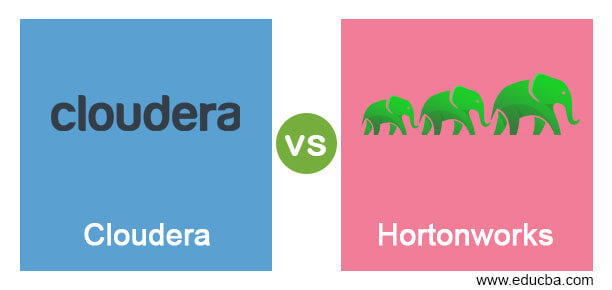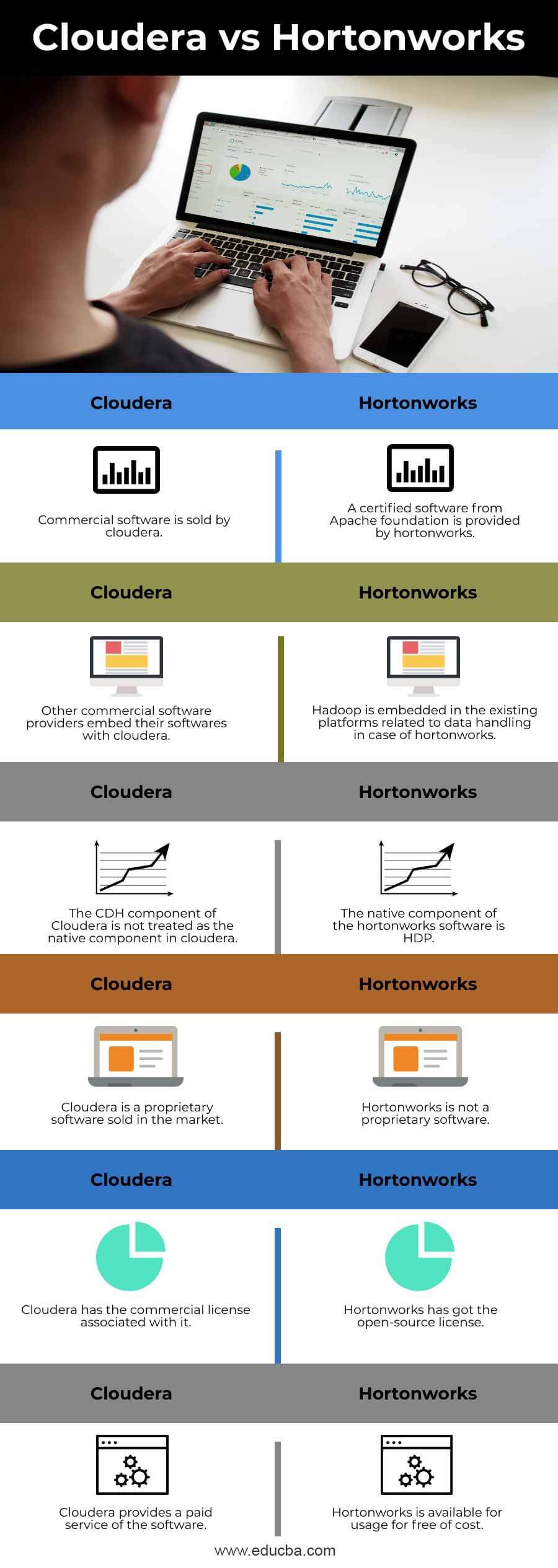Updated March 4, 2023
Difference Between Cloudera vs Hortonworks
Cloudera and Hortonworks are the enterprise-ready Hadoop distribution tools that are built using the open-source framework of Hadoop to provide the customized and user friendly distribution mechanisms to the users. The code of Hadoop is open source that means it can be further accessed and modified by anyone. Many vendors have tried creating their own customizations that include support for technicalities, regular routine updates of system, own proprietary technology, user-friendly GUIs, management tools and easy packaged installers. Cloudera and Hortonworks are some of those vendors. In this article, we will compare cloudera and hortonworks and study the similarities and differences that exist between both of them. In this topic, we are going to learn about Cloudera vs Hortonworks.
Cloudera
Cloudera Hadoop framework provides various new features and enhancements like module for helping the resource management, deployment using wizard and dashboard management which results in simplification in the plan of expansion and capacity management. Cloudera is one of the oldest software in the market that I available for handling the data that is based on the Hadoop framework. It is the software which provides very sophisticated components that prove very beneficial while handling the data. Cloudera is a paid software that provides 60 days free trial usage. This software is the most accepted and used software in the market right now for handling big data in Hadoop.
Hortonworks
Hortonworks platform is newly released in the market. However, within a short period of time from its arrival, it has captured great acceptance and is one of the most leading and emerging platform of Hadoop framework. Hortonworks creators are also engaged in contributing to the development of one of the most recent innovation of Hadoop named yarn. If you are skilled in using the cloudera, you will easily be able to use the hortonworks software.
Head to Head Comparison Between Cloudera vs Hortonworks (Infographics)
Below are the top differences between Cloudera and Hortonworks
Similarities between Cloudera and Hortonworks
As both the suites are built-up on the same open-source platform of Hadoop framework, they share a lot of similarities in their features. Some of the similarities between cloudera and hortonworks are as specified below –
- Stability and security are provided by both the vendors.
- They are a complete enterprise-ready suite based on Hadoop framework.
- Both platforms have the communities that participate and provide huge support and help for all the problems that are faced while using the platforms and also while the demonstrations are needed.
- Hortonworks and cloudera have Master-Slave architecture as the base on which they are built-up.
- Both the platforms provide paid training of their software for the users.
- The framework followed by both the platforms is shared-nothing.
- Support for Hadoop technologies like yarn and map reduce are provided by both the platforms.
Differences between Cloudera and Hortonworks
Even though both the platforms use the same core technology of Hadoop framework and have several similarities, differences are what makes them special and act as a decision maker for choosing the right technology for us. Following are the key differences between both the vendors –
- Hortonworks is completely and open-source suite that is offered by the software that are certified by the apache foundation while cloudera is based on the open-source Hadoop distribution but itself is a commercial software that is sold individually.
- Cloudera follows a traditional approach of a software provider and is profited by working as a product seller. Cloudera is in competition with other software providers in the market that are working commercially while hortonworks is not a proprietary software and is focusing completely on embedding the functionalities of the Hadoop framework into existing platforms of data which is the business growth strategy followed by hortonworks.
- Hortonworks uses different softwares for different purposes as it itself is not a proprietary software while cloudera has its own software that helps in management of proprietary. The technologies used by hortonworks include apache solr, ambari and stinger which are used for searching of data, management and query handling respectively. Cloudera on the other hand uses cloudera search, cloudera manager and impala for for searching of data, management and query handling respectively.
- cloudera provides a free trial usage for 60 days after which the service is the paid one. In case of Hortonworks, the usage of this service is completely free of cost.
- Updates released by hortonworks come quicker than that of cloudera.
Comparison Table
The following table gives a detail comparison and summarization of all the key differences that exist between cloudera and hortonworks –
| Cloudera | Hortonworks |
| Commercial software is sold by cloudera. | A certified software from Apache foundation is provided by hortonworks. |
| Other commercial software providers embed their softwares with cloudera. | Hadoop is embedded in the existing platforms related to data handling in case of hortonworks. |
| The CDH component of Cloudera is not treated as the native component in cloudera. | The native component of the hortonworks software is HDP. |
| Cloudera is a proprietary software sold in the market. | Hortonworks is not a proprietary software. |
| Cloudera has the commercial license associated with it. | Hortonworks has got the open-source license. |
| Cloudera provides a paid service of the software. | Hortonworks is available for usage for free of cost. |
Conclusion – Cloudera vs Hortonworks
Hortonworks is the latest emerging technological software available in the market for Hadoop distribution and is completely open-source and comes with a software that is certified by apache foundation. Cloudera is one of the oldest Hadoop distribution tool that is widely used in the market. Cloudera comes with very sophisticated features that prove to be very beneficial in distribution of data. Cloudera is a paid software which provides 60 days free trial.
Once you are skilled to use the cloudera software, you will easily be able to handle the hortonworks. Though both the softwares are based on the same core and framework of Hadoop, they have many differences as discussed above. Cloudera comes with many advanced and sophisticated d=features as compared to hortonworks. But as said hortonworks is new in market and is continuously evolving. One has to very carefully analyze the requirements, understand the purpose of using the software and take into the consideration all the pros and cons of both the software before deciding which one to go for.
Recommended Articles
This is a guide to Cloudera vs Hortonworks. Here we discuss the Cloudera vs Hortonworks key differences with infographics and comparison table. You may also have a look at the following articles to learn more –




